BESC1061 Developmental Psychology: Reflective Essay on Life Events
VerifiedAdded on 2023/04/24
|7
|1971
|155
Essay
AI Summary
This essay presents a reflective account of the author's academic development, analyzing their experiences through the lenses of behaviorist and cognitive theories of developmental psychology. The author recounts early academic struggles, bullying, and low self-esteem, followed by a turning point when they were able to focus on preferred subjects. The essay connects these experiences to Pavlov's behaviorist theory, emphasizing the impact of perseverance and positive reinforcement from supportive teachers, as well as Skinner's ideas of positive and negative conditioning. It also applies Bloom's cognitive theory, highlighting the importance of emotional support in learning. The author concludes that both theories offer valuable insights, with the behaviorist model accounting for negative influences and the cognitive model emphasizing the role of emotions. The essay suggests that emotional encouragement is a valuable approach for psychologists in helping clients with mental health issues. Desklib provides a platform to explore similar essays and solved assignments.
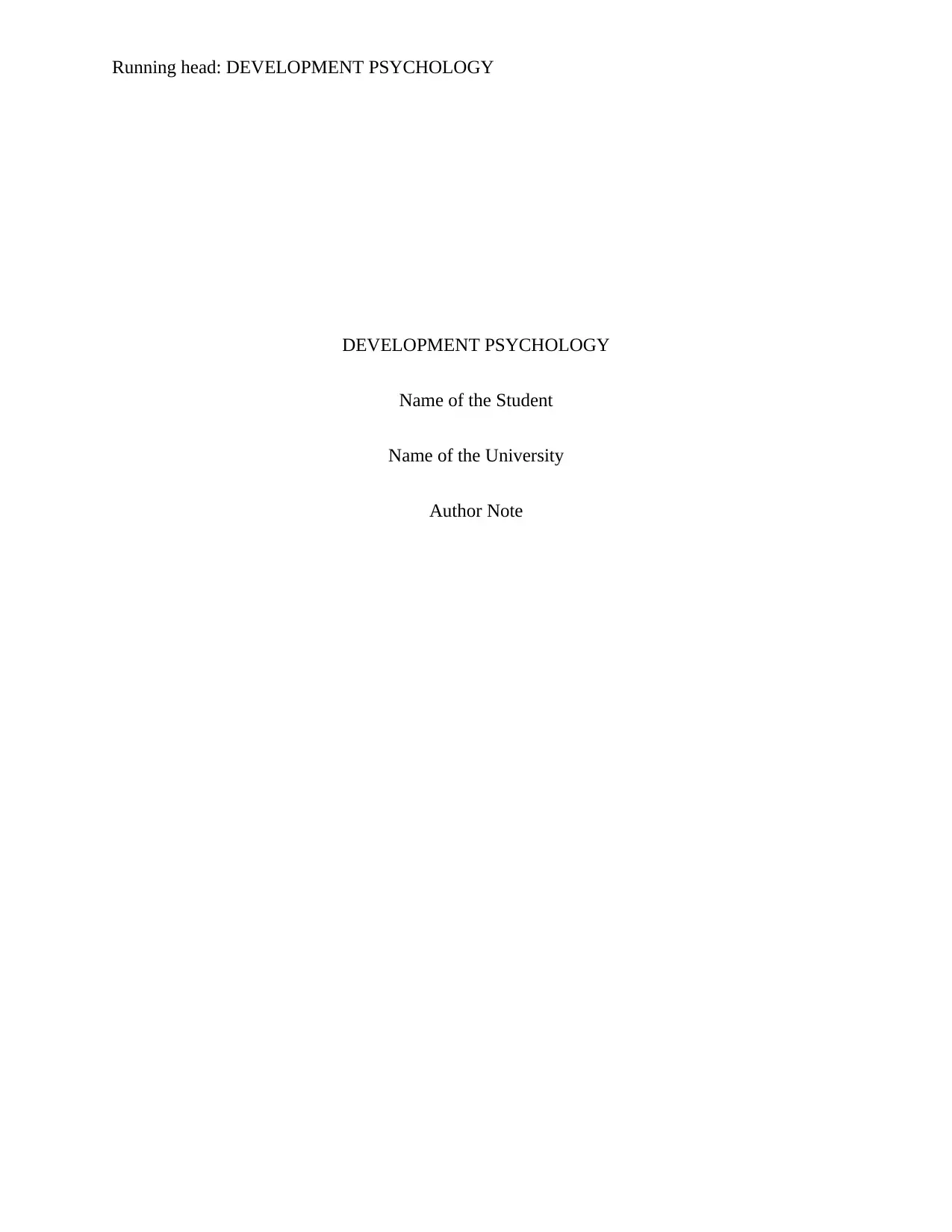
Running head: DEVELOPMENT PSYCHOLOGY
DEVELOPMENT PSYCHOLOGY
Name of the Student
Name of the University
Author Note
DEVELOPMENT PSYCHOLOGY
Name of the Student
Name of the University
Author Note
Paraphrase This Document
Need a fresh take? Get an instant paraphrase of this document with our AI Paraphraser
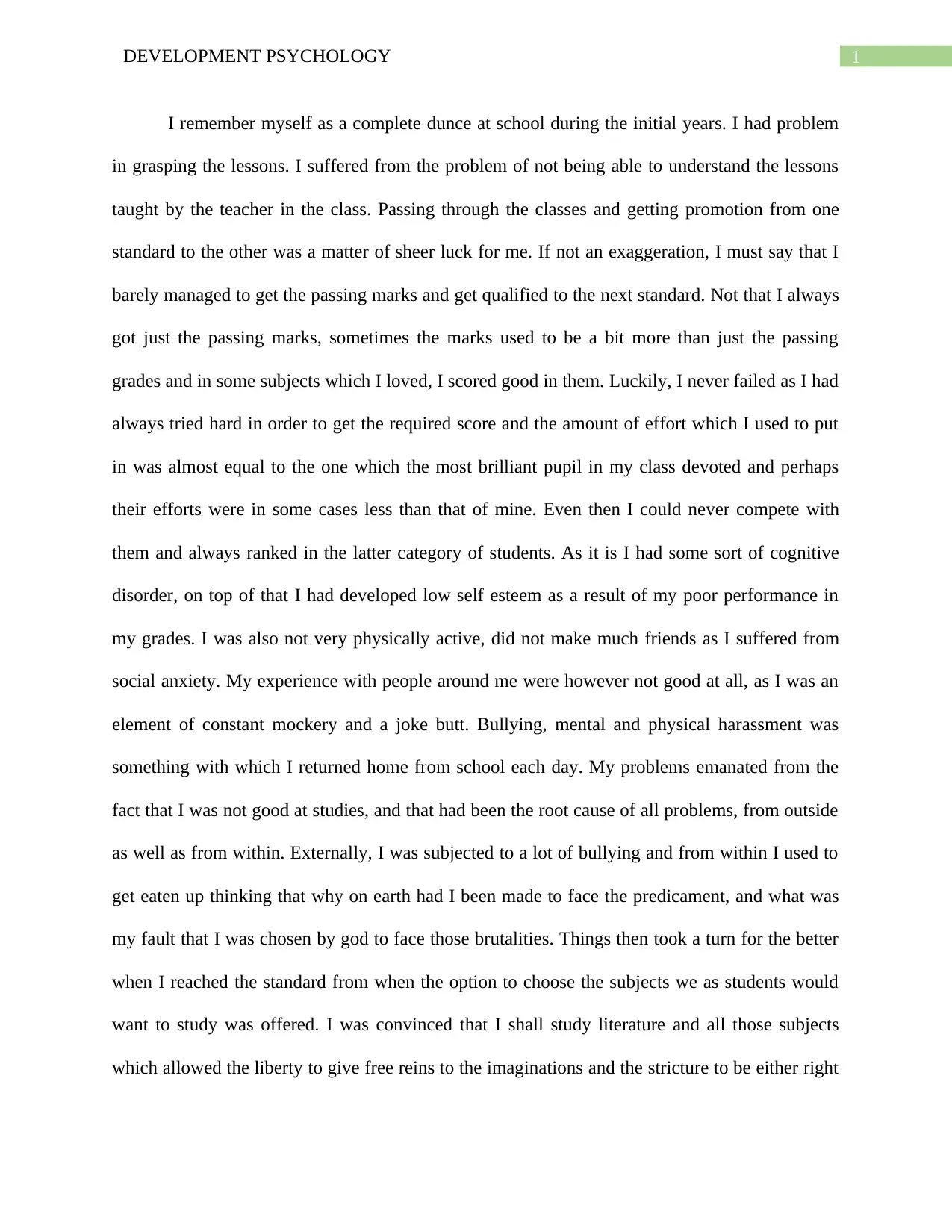
1DEVELOPMENT PSYCHOLOGY
I remember myself as a complete dunce at school during the initial years. I had problem
in grasping the lessons. I suffered from the problem of not being able to understand the lessons
taught by the teacher in the class. Passing through the classes and getting promotion from one
standard to the other was a matter of sheer luck for me. If not an exaggeration, I must say that I
barely managed to get the passing marks and get qualified to the next standard. Not that I always
got just the passing marks, sometimes the marks used to be a bit more than just the passing
grades and in some subjects which I loved, I scored good in them. Luckily, I never failed as I had
always tried hard in order to get the required score and the amount of effort which I used to put
in was almost equal to the one which the most brilliant pupil in my class devoted and perhaps
their efforts were in some cases less than that of mine. Even then I could never compete with
them and always ranked in the latter category of students. As it is I had some sort of cognitive
disorder, on top of that I had developed low self esteem as a result of my poor performance in
my grades. I was also not very physically active, did not make much friends as I suffered from
social anxiety. My experience with people around me were however not good at all, as I was an
element of constant mockery and a joke butt. Bullying, mental and physical harassment was
something with which I returned home from school each day. My problems emanated from the
fact that I was not good at studies, and that had been the root cause of all problems, from outside
as well as from within. Externally, I was subjected to a lot of bullying and from within I used to
get eaten up thinking that why on earth had I been made to face the predicament, and what was
my fault that I was chosen by god to face those brutalities. Things then took a turn for the better
when I reached the standard from when the option to choose the subjects we as students would
want to study was offered. I was convinced that I shall study literature and all those subjects
which allowed the liberty to give free reins to the imaginations and the stricture to be either right
I remember myself as a complete dunce at school during the initial years. I had problem
in grasping the lessons. I suffered from the problem of not being able to understand the lessons
taught by the teacher in the class. Passing through the classes and getting promotion from one
standard to the other was a matter of sheer luck for me. If not an exaggeration, I must say that I
barely managed to get the passing marks and get qualified to the next standard. Not that I always
got just the passing marks, sometimes the marks used to be a bit more than just the passing
grades and in some subjects which I loved, I scored good in them. Luckily, I never failed as I had
always tried hard in order to get the required score and the amount of effort which I used to put
in was almost equal to the one which the most brilliant pupil in my class devoted and perhaps
their efforts were in some cases less than that of mine. Even then I could never compete with
them and always ranked in the latter category of students. As it is I had some sort of cognitive
disorder, on top of that I had developed low self esteem as a result of my poor performance in
my grades. I was also not very physically active, did not make much friends as I suffered from
social anxiety. My experience with people around me were however not good at all, as I was an
element of constant mockery and a joke butt. Bullying, mental and physical harassment was
something with which I returned home from school each day. My problems emanated from the
fact that I was not good at studies, and that had been the root cause of all problems, from outside
as well as from within. Externally, I was subjected to a lot of bullying and from within I used to
get eaten up thinking that why on earth had I been made to face the predicament, and what was
my fault that I was chosen by god to face those brutalities. Things then took a turn for the better
when I reached the standard from when the option to choose the subjects we as students would
want to study was offered. I was convinced that I shall study literature and all those subjects
which allowed the liberty to give free reins to the imaginations and the stricture to be either right
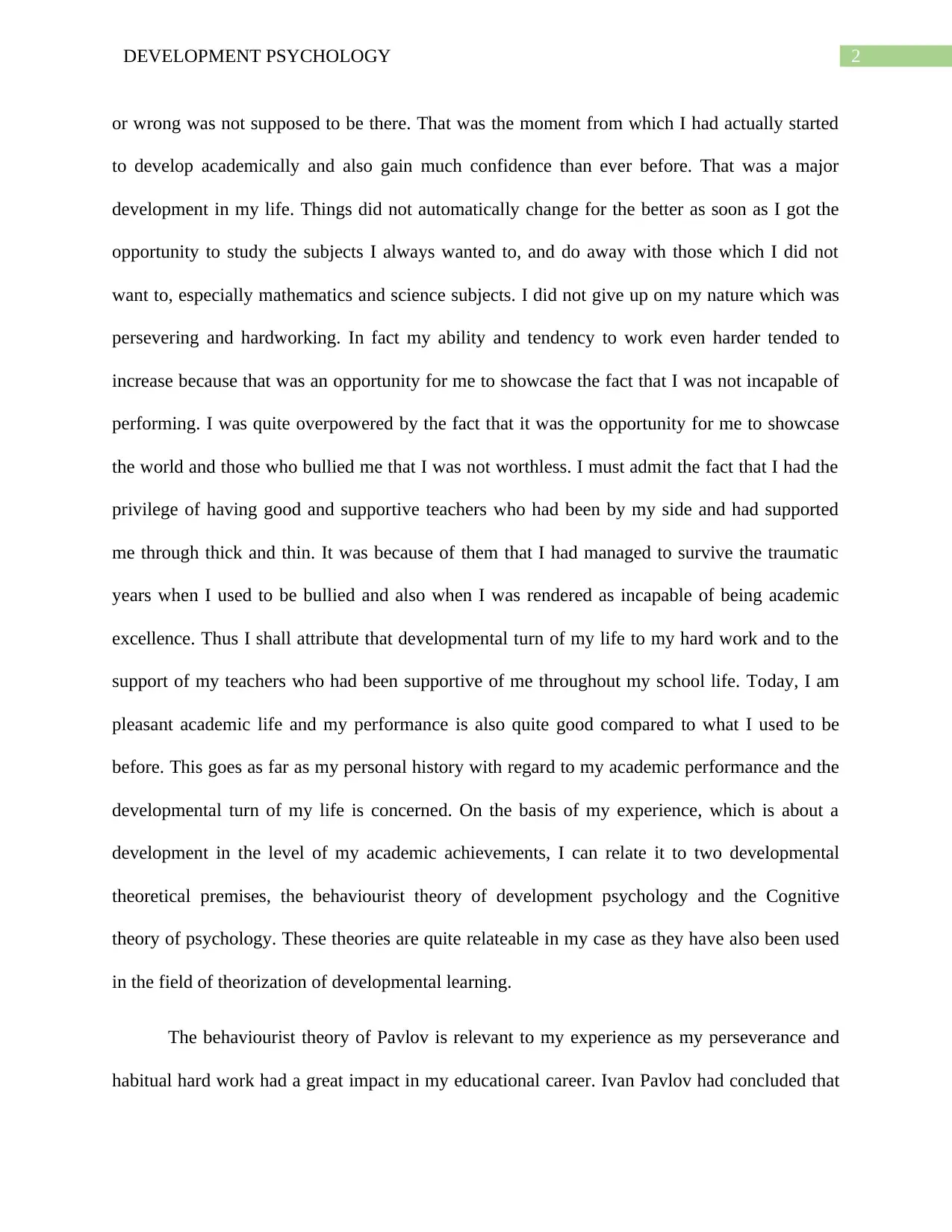
2DEVELOPMENT PSYCHOLOGY
or wrong was not supposed to be there. That was the moment from which I had actually started
to develop academically and also gain much confidence than ever before. That was a major
development in my life. Things did not automatically change for the better as soon as I got the
opportunity to study the subjects I always wanted to, and do away with those which I did not
want to, especially mathematics and science subjects. I did not give up on my nature which was
persevering and hardworking. In fact my ability and tendency to work even harder tended to
increase because that was an opportunity for me to showcase the fact that I was not incapable of
performing. I was quite overpowered by the fact that it was the opportunity for me to showcase
the world and those who bullied me that I was not worthless. I must admit the fact that I had the
privilege of having good and supportive teachers who had been by my side and had supported
me through thick and thin. It was because of them that I had managed to survive the traumatic
years when I used to be bullied and also when I was rendered as incapable of being academic
excellence. Thus I shall attribute that developmental turn of my life to my hard work and to the
support of my teachers who had been supportive of me throughout my school life. Today, I am
pleasant academic life and my performance is also quite good compared to what I used to be
before. This goes as far as my personal history with regard to my academic performance and the
developmental turn of my life is concerned. On the basis of my experience, which is about a
development in the level of my academic achievements, I can relate it to two developmental
theoretical premises, the behaviourist theory of development psychology and the Cognitive
theory of psychology. These theories are quite relateable in my case as they have also been used
in the field of theorization of developmental learning.
The behaviourist theory of Pavlov is relevant to my experience as my perseverance and
habitual hard work had a great impact in my educational career. Ivan Pavlov had concluded that
or wrong was not supposed to be there. That was the moment from which I had actually started
to develop academically and also gain much confidence than ever before. That was a major
development in my life. Things did not automatically change for the better as soon as I got the
opportunity to study the subjects I always wanted to, and do away with those which I did not
want to, especially mathematics and science subjects. I did not give up on my nature which was
persevering and hardworking. In fact my ability and tendency to work even harder tended to
increase because that was an opportunity for me to showcase the fact that I was not incapable of
performing. I was quite overpowered by the fact that it was the opportunity for me to showcase
the world and those who bullied me that I was not worthless. I must admit the fact that I had the
privilege of having good and supportive teachers who had been by my side and had supported
me through thick and thin. It was because of them that I had managed to survive the traumatic
years when I used to be bullied and also when I was rendered as incapable of being academic
excellence. Thus I shall attribute that developmental turn of my life to my hard work and to the
support of my teachers who had been supportive of me throughout my school life. Today, I am
pleasant academic life and my performance is also quite good compared to what I used to be
before. This goes as far as my personal history with regard to my academic performance and the
developmental turn of my life is concerned. On the basis of my experience, which is about a
development in the level of my academic achievements, I can relate it to two developmental
theoretical premises, the behaviourist theory of development psychology and the Cognitive
theory of psychology. These theories are quite relateable in my case as they have also been used
in the field of theorization of developmental learning.
The behaviourist theory of Pavlov is relevant to my experience as my perseverance and
habitual hard work had a great impact in my educational career. Ivan Pavlov had concluded that
⊘ This is a preview!⊘
Do you want full access?
Subscribe today to unlock all pages.

Trusted by 1+ million students worldwide
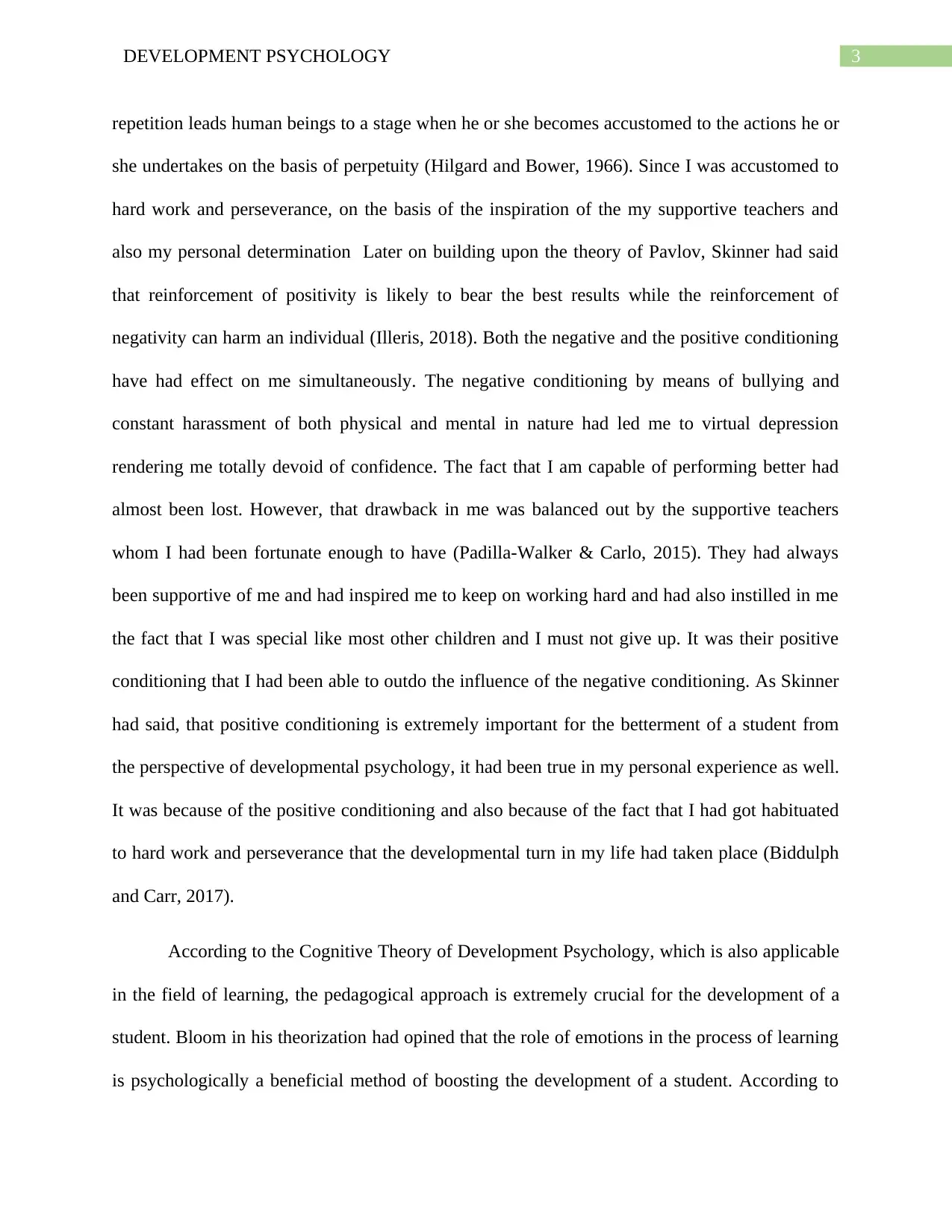
3DEVELOPMENT PSYCHOLOGY
repetition leads human beings to a stage when he or she becomes accustomed to the actions he or
she undertakes on the basis of perpetuity (Hilgard and Bower, 1966). Since I was accustomed to
hard work and perseverance, on the basis of the inspiration of the my supportive teachers and
also my personal determination Later on building upon the theory of Pavlov, Skinner had said
that reinforcement of positivity is likely to bear the best results while the reinforcement of
negativity can harm an individual (Illeris, 2018). Both the negative and the positive conditioning
have had effect on me simultaneously. The negative conditioning by means of bullying and
constant harassment of both physical and mental in nature had led me to virtual depression
rendering me totally devoid of confidence. The fact that I am capable of performing better had
almost been lost. However, that drawback in me was balanced out by the supportive teachers
whom I had been fortunate enough to have (Padilla-Walker & Carlo, 2015). They had always
been supportive of me and had inspired me to keep on working hard and had also instilled in me
the fact that I was special like most other children and I must not give up. It was their positive
conditioning that I had been able to outdo the influence of the negative conditioning. As Skinner
had said, that positive conditioning is extremely important for the betterment of a student from
the perspective of developmental psychology, it had been true in my personal experience as well.
It was because of the positive conditioning and also because of the fact that I had got habituated
to hard work and perseverance that the developmental turn in my life had taken place (Biddulph
and Carr, 2017).
According to the Cognitive Theory of Development Psychology, which is also applicable
in the field of learning, the pedagogical approach is extremely crucial for the development of a
student. Bloom in his theorization had opined that the role of emotions in the process of learning
is psychologically a beneficial method of boosting the development of a student. According to
repetition leads human beings to a stage when he or she becomes accustomed to the actions he or
she undertakes on the basis of perpetuity (Hilgard and Bower, 1966). Since I was accustomed to
hard work and perseverance, on the basis of the inspiration of the my supportive teachers and
also my personal determination Later on building upon the theory of Pavlov, Skinner had said
that reinforcement of positivity is likely to bear the best results while the reinforcement of
negativity can harm an individual (Illeris, 2018). Both the negative and the positive conditioning
have had effect on me simultaneously. The negative conditioning by means of bullying and
constant harassment of both physical and mental in nature had led me to virtual depression
rendering me totally devoid of confidence. The fact that I am capable of performing better had
almost been lost. However, that drawback in me was balanced out by the supportive teachers
whom I had been fortunate enough to have (Padilla-Walker & Carlo, 2015). They had always
been supportive of me and had inspired me to keep on working hard and had also instilled in me
the fact that I was special like most other children and I must not give up. It was their positive
conditioning that I had been able to outdo the influence of the negative conditioning. As Skinner
had said, that positive conditioning is extremely important for the betterment of a student from
the perspective of developmental psychology, it had been true in my personal experience as well.
It was because of the positive conditioning and also because of the fact that I had got habituated
to hard work and perseverance that the developmental turn in my life had taken place (Biddulph
and Carr, 2017).
According to the Cognitive Theory of Development Psychology, which is also applicable
in the field of learning, the pedagogical approach is extremely crucial for the development of a
student. Bloom in his theorization had opined that the role of emotions in the process of learning
is psychologically a beneficial method of boosting the development of a student. According to
Paraphrase This Document
Need a fresh take? Get an instant paraphrase of this document with our AI Paraphraser
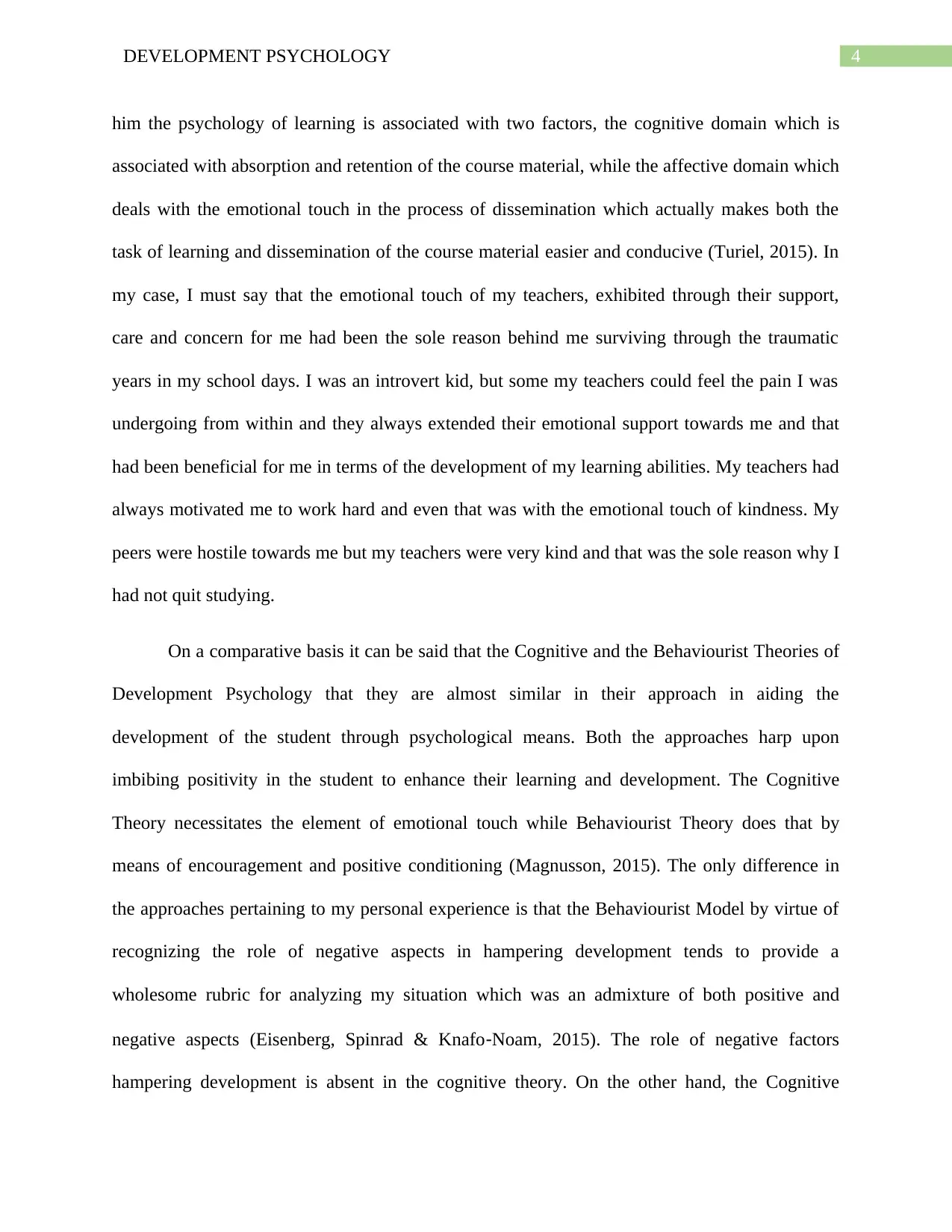
4DEVELOPMENT PSYCHOLOGY
him the psychology of learning is associated with two factors, the cognitive domain which is
associated with absorption and retention of the course material, while the affective domain which
deals with the emotional touch in the process of dissemination which actually makes both the
task of learning and dissemination of the course material easier and conducive (Turiel, 2015). In
my case, I must say that the emotional touch of my teachers, exhibited through their support,
care and concern for me had been the sole reason behind me surviving through the traumatic
years in my school days. I was an introvert kid, but some my teachers could feel the pain I was
undergoing from within and they always extended their emotional support towards me and that
had been beneficial for me in terms of the development of my learning abilities. My teachers had
always motivated me to work hard and even that was with the emotional touch of kindness. My
peers were hostile towards me but my teachers were very kind and that was the sole reason why I
had not quit studying.
On a comparative basis it can be said that the Cognitive and the Behaviourist Theories of
Development Psychology that they are almost similar in their approach in aiding the
development of the student through psychological means. Both the approaches harp upon
imbibing positivity in the student to enhance their learning and development. The Cognitive
Theory necessitates the element of emotional touch while Behaviourist Theory does that by
means of encouragement and positive conditioning (Magnusson, 2015). The only difference in
the approaches pertaining to my personal experience is that the Behaviourist Model by virtue of
recognizing the role of negative aspects in hampering development tends to provide a
wholesome rubric for analyzing my situation which was an admixture of both positive and
negative aspects (Eisenberg, Spinrad & Knafo‐Noam, 2015). The role of negative factors
hampering development is absent in the cognitive theory. On the other hand, the Cognitive
him the psychology of learning is associated with two factors, the cognitive domain which is
associated with absorption and retention of the course material, while the affective domain which
deals with the emotional touch in the process of dissemination which actually makes both the
task of learning and dissemination of the course material easier and conducive (Turiel, 2015). In
my case, I must say that the emotional touch of my teachers, exhibited through their support,
care and concern for me had been the sole reason behind me surviving through the traumatic
years in my school days. I was an introvert kid, but some my teachers could feel the pain I was
undergoing from within and they always extended their emotional support towards me and that
had been beneficial for me in terms of the development of my learning abilities. My teachers had
always motivated me to work hard and even that was with the emotional touch of kindness. My
peers were hostile towards me but my teachers were very kind and that was the sole reason why I
had not quit studying.
On a comparative basis it can be said that the Cognitive and the Behaviourist Theories of
Development Psychology that they are almost similar in their approach in aiding the
development of the student through psychological means. Both the approaches harp upon
imbibing positivity in the student to enhance their learning and development. The Cognitive
Theory necessitates the element of emotional touch while Behaviourist Theory does that by
means of encouragement and positive conditioning (Magnusson, 2015). The only difference in
the approaches pertaining to my personal experience is that the Behaviourist Model by virtue of
recognizing the role of negative aspects in hampering development tends to provide a
wholesome rubric for analyzing my situation which was an admixture of both positive and
negative aspects (Eisenberg, Spinrad & Knafo‐Noam, 2015). The role of negative factors
hampering development is absent in the cognitive theory. On the other hand, the Cognitive
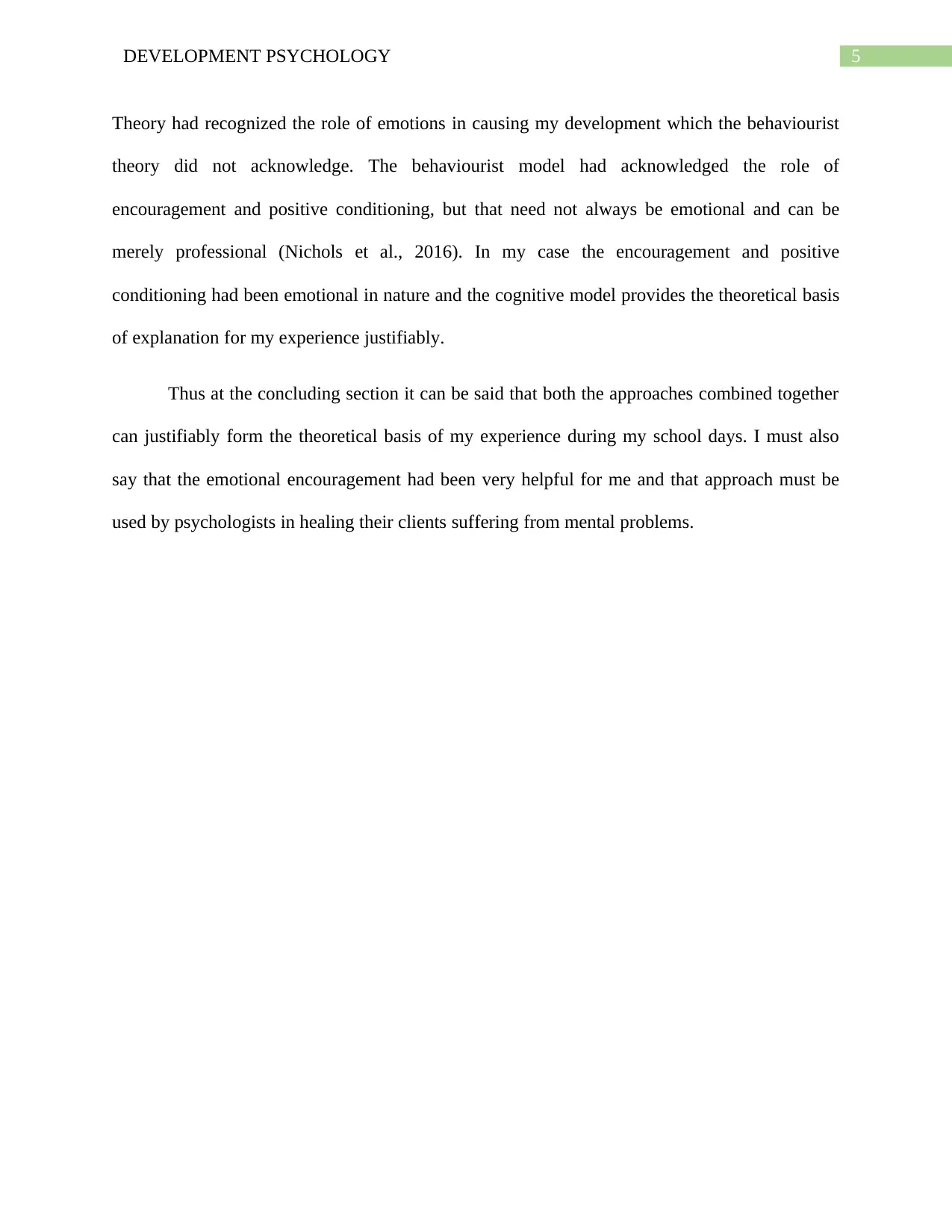
5DEVELOPMENT PSYCHOLOGY
Theory had recognized the role of emotions in causing my development which the behaviourist
theory did not acknowledge. The behaviourist model had acknowledged the role of
encouragement and positive conditioning, but that need not always be emotional and can be
merely professional (Nichols et al., 2016). In my case the encouragement and positive
conditioning had been emotional in nature and the cognitive model provides the theoretical basis
of explanation for my experience justifiably.
Thus at the concluding section it can be said that both the approaches combined together
can justifiably form the theoretical basis of my experience during my school days. I must also
say that the emotional encouragement had been very helpful for me and that approach must be
used by psychologists in healing their clients suffering from mental problems.
Theory had recognized the role of emotions in causing my development which the behaviourist
theory did not acknowledge. The behaviourist model had acknowledged the role of
encouragement and positive conditioning, but that need not always be emotional and can be
merely professional (Nichols et al., 2016). In my case the encouragement and positive
conditioning had been emotional in nature and the cognitive model provides the theoretical basis
of explanation for my experience justifiably.
Thus at the concluding section it can be said that both the approaches combined together
can justifiably form the theoretical basis of my experience during my school days. I must also
say that the emotional encouragement had been very helpful for me and that approach must be
used by psychologists in healing their clients suffering from mental problems.
⊘ This is a preview!⊘
Do you want full access?
Subscribe today to unlock all pages.

Trusted by 1+ million students worldwide
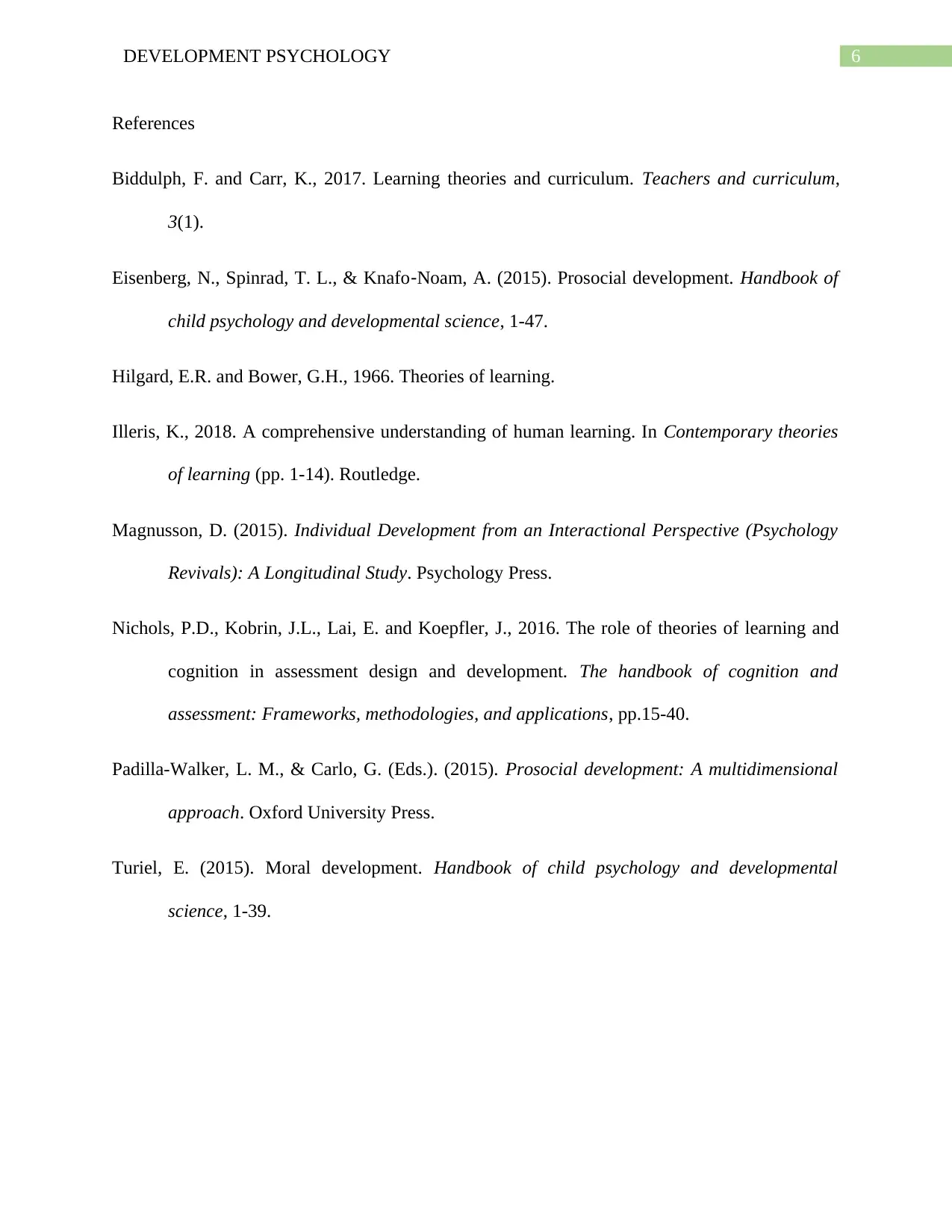
6DEVELOPMENT PSYCHOLOGY
References
Biddulph, F. and Carr, K., 2017. Learning theories and curriculum. Teachers and curriculum,
3(1).
Eisenberg, N., Spinrad, T. L., & Knafo‐Noam, A. (2015). Prosocial development. Handbook of
child psychology and developmental science, 1-47.
Hilgard, E.R. and Bower, G.H., 1966. Theories of learning.
Illeris, K., 2018. A comprehensive understanding of human learning. In Contemporary theories
of learning (pp. 1-14). Routledge.
Magnusson, D. (2015). Individual Development from an Interactional Perspective (Psychology
Revivals): A Longitudinal Study. Psychology Press.
Nichols, P.D., Kobrin, J.L., Lai, E. and Koepfler, J., 2016. The role of theories of learning and
cognition in assessment design and development. The handbook of cognition and
assessment: Frameworks, methodologies, and applications, pp.15-40.
Padilla-Walker, L. M., & Carlo, G. (Eds.). (2015). Prosocial development: A multidimensional
approach. Oxford University Press.
Turiel, E. (2015). Moral development. Handbook of child psychology and developmental
science, 1-39.
References
Biddulph, F. and Carr, K., 2017. Learning theories and curriculum. Teachers and curriculum,
3(1).
Eisenberg, N., Spinrad, T. L., & Knafo‐Noam, A. (2015). Prosocial development. Handbook of
child psychology and developmental science, 1-47.
Hilgard, E.R. and Bower, G.H., 1966. Theories of learning.
Illeris, K., 2018. A comprehensive understanding of human learning. In Contemporary theories
of learning (pp. 1-14). Routledge.
Magnusson, D. (2015). Individual Development from an Interactional Perspective (Psychology
Revivals): A Longitudinal Study. Psychology Press.
Nichols, P.D., Kobrin, J.L., Lai, E. and Koepfler, J., 2016. The role of theories of learning and
cognition in assessment design and development. The handbook of cognition and
assessment: Frameworks, methodologies, and applications, pp.15-40.
Padilla-Walker, L. M., & Carlo, G. (Eds.). (2015). Prosocial development: A multidimensional
approach. Oxford University Press.
Turiel, E. (2015). Moral development. Handbook of child psychology and developmental
science, 1-39.
1 out of 7
Related Documents
Your All-in-One AI-Powered Toolkit for Academic Success.
+13062052269
info@desklib.com
Available 24*7 on WhatsApp / Email
![[object Object]](/_next/static/media/star-bottom.7253800d.svg)
Unlock your academic potential
Copyright © 2020–2026 A2Z Services. All Rights Reserved. Developed and managed by ZUCOL.





